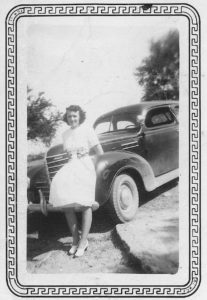 My favorite grandmother took her own life in 1950 — 11 years before I was born. My other grandmothers were fine — my father’s father provided me with four grandmothers — but my father’s mother is my favorite.
My favorite grandmother took her own life in 1950 — 11 years before I was born. My other grandmothers were fine — my father’s father provided me with four grandmothers — but my father’s mother is my favorite.
I have a tiny photograph in my desk drawer. My grandmother is leaning on the fender of a 1930s Plymouth coupe — the kind Warren Beatty drove in Bonnie and Clyde. She is wearing a white dress and high heel pumps. Her hair looks like it is bobby pinned.
 She is an attractive woman in her 20s trying unsuccessfully to smile. Maybe she is looking into the sun or perhaps she cannot quite figure out how to smile. My grandmother suffered from depression at a time when mental illness was less understood and medication was woefully inadequate.
She is an attractive woman in her 20s trying unsuccessfully to smile. Maybe she is looking into the sun or perhaps she cannot quite figure out how to smile. My grandmother suffered from depression at a time when mental illness was less understood and medication was woefully inadequate.
She has been my favorite grandmother since I learned that she wrote a novel. Most of my ancestors, including the Methodist preacher, the horse thief and the railroad boss who “was never convicted of murdering anyone,” were not big on books. I find it hard to imagine my relatives reading books much less writing them. When my family members went fishing or hunting and I wanted to stay home and read I thought: “Grandmother Ruth would understand.”
I have thought about what I would say to this wounded woman whose genes I carry if I could go back in time: “You have a grandson on the way who wants to meet you and talk about books and writing. You can’t imagine the people who will need you someday.”
When my parents asked what I wanted for Christmas one year, I requested a copy of my grandmother’s novel. You do not have to read far to understand why it was never published. The story is painfully autobiographical. She describes in dark detail the deaths of two of her children.
In one of many anguished passages she blames herself as well as God. She believes that her baby died because she “clung to the doubt that was forever in the back of my mind.”
As the death of a second child approaches, her mother, the daughter of a Baptist preacher, says, “I can only hope and pray and be ready to reconcile myself to whatever is God’s will.”
My grandmother responds, “If the baby dies, do you think that God will be treating me right?”
“God treats everyone right, you know that.”
God must cringe when a well-meaning person speaks such blasphemy. No one in the novel ever suggests that God weeps for every grieving parent or that it is not God’s will for children to die. I do not know all of the reasons my grandmother took her life, but bad theology contributed to her death.
I have been thinking about my grandmother since the suicides of Anthony Bourdain and Kate Spade. Their tragic deaths have brought much-needed attention to the growing epidemic of suicides. Some of the fatalities were victims of bad theology. Some never heard a helpful word from the church.
Mental illness is complicated and the church does not have all of the answers, but at the very least the church has to speak loudly and clearly of God’s love, mercy and liberation.
I wish someone had said this to my grandmother before she died far too soon: “We can’t imagine the pain you feel, but God can. God grieves with us. You can hold on, because God is holding on to you.”
A word of hope might have changed the ending.
